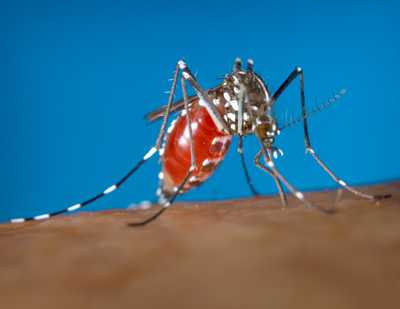Dengue and Chikungunya in Our Backyard: Preventing Aedes Mosquito-Borne Disease
Tuesday, May 19 at 1pm EDT
 Aedes aegypti and Aedes albopictus mosquitoes are the primary vectors for dengue, chikungunya, yellow fever, and Zika viruses. Taken together, these viruses account for almost 100 million cases of mosquito-borne disease per year. Globally, dengue is the most important mosquito-borne viral disease. In the last 50 years, incidence has increased 30-fold by expanding into new countries and new areas. Chikungunya often occurs in large outbreaks with high infection rates, affecting more than a third of the population in areas where the virus is circulating. In 2014, more than a million cases were reported worldwide. While Chikungunya disease rarely results in death, the symptoms can be severe and disabling.
Aedes aegypti and Aedes albopictus mosquitoes are the primary vectors for dengue, chikungunya, yellow fever, and Zika viruses. Taken together, these viruses account for almost 100 million cases of mosquito-borne disease per year. Globally, dengue is the most important mosquito-borne viral disease. In the last 50 years, incidence has increased 30-fold by expanding into new countries and new areas. Chikungunya often occurs in large outbreaks with high infection rates, affecting more than a third of the population in areas where the virus is circulating. In 2014, more than a million cases were reported worldwide. While Chikungunya disease rarely results in death, the symptoms can be severe and disabling.
Outbreaks of mosquito-borne diseases depend on many factors and are especially difficult to predict, prevent and control. Because there are no licensed vaccines available to prevent dengue or chikungunya, controlling mosquito populations and reducing bites are currently the most effective prevention measures.
This session of Grand Rounds will highlight the importance of preventing Aedes mosquito-borne diseases and the need for improved diagnostic, prevention and control measures.
Presentation
May 2015
Dr. Phoebe Thorpe and Dr. Marc Fischer discuss the diseases transmitted by Aedes aegypti mosquitos and some practical ways individuals can protect themselves.
Individuals should limit exposure to mosquitos by
- Using repellants when outdoors
- Emptying standing water sources around their homes
- Wearing long pants and long-sleeves and
- Ensuring that window and door screens are intact
Providers should
- Take advantage of CDC’s clinical case management training
- Be aware of signs and symptoms of mosquito-borne diseases
Presented By:
Marc Fischer, MD, MPH
Chief, Surveillance and Epidemiology Activity, Arboviral Diseases Branch
Division of Vector-Borne Diseases
National Center for Emerging and Zoonotic Infectious Diseases, CDC
“Dengue, Chikungunya and Other Aedes Mosquito-Borne Diseases”
Thomas W. Scott, PhD
Professor and Director, Vector-Borne Disease Laboratory
Department of Entomology and Nematology
University of California, Davis
“The Status and Frontiers of Vector Control”
Harold Margolis, MD
Branch Chief, Dengue Branch
Division of Vector-Borne Diseases
National Center for Emerging and Zoonotic Infectious Diseases, CDC
“Prevention Strategies for Aedes Mosquito-Borne Diseases”
Facilitated By:
John Iskander, MD, MPH, Scientific Director, Public Health Grand Rounds
Phoebe Thorpe, MD, MPH, Deputy Scientific Director, Public Health Grand Rounds
Susan Laird, MSN, RN, Communications Director, Public Health Grand Rounds
Additional Resources:
Continuing Education
This session is available for Continuing Education. Click here for more information.
- Page last reviewed: May 22, 2015
- Page last updated: May 22, 2015
- Content source:
- Centers for Disease Control and Prevention
- Page maintained by: Office of Associate Director of Communication, Division of Public Affairs



 ShareCompartir
ShareCompartir